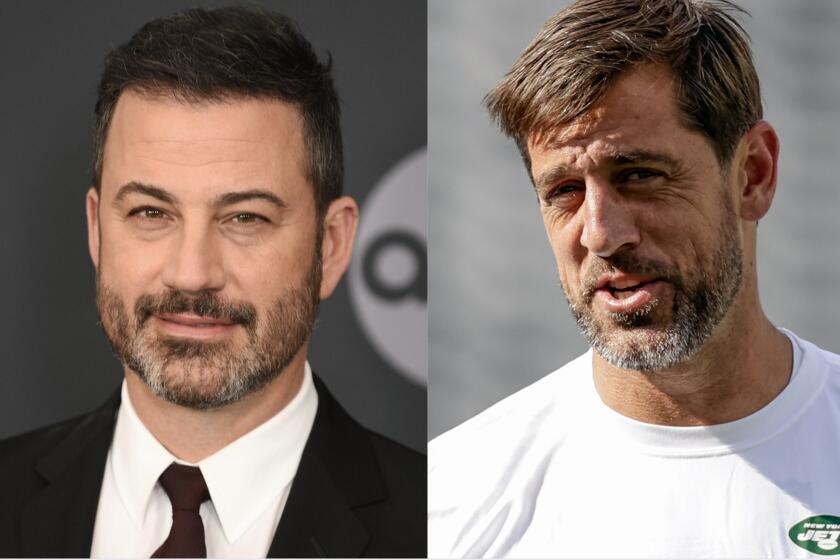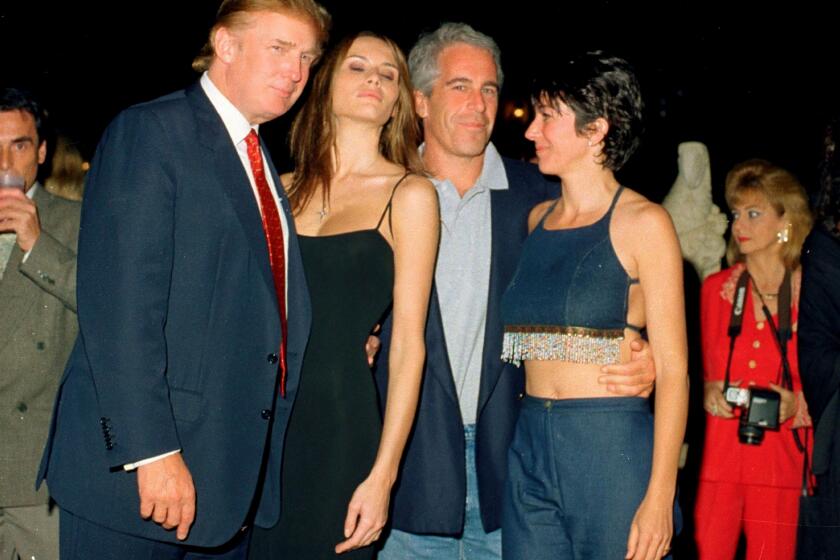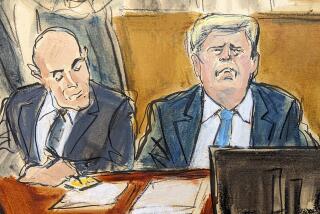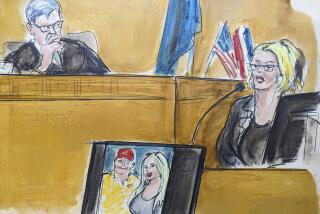New Epstein documents reveal more details of sex-trafficking operation
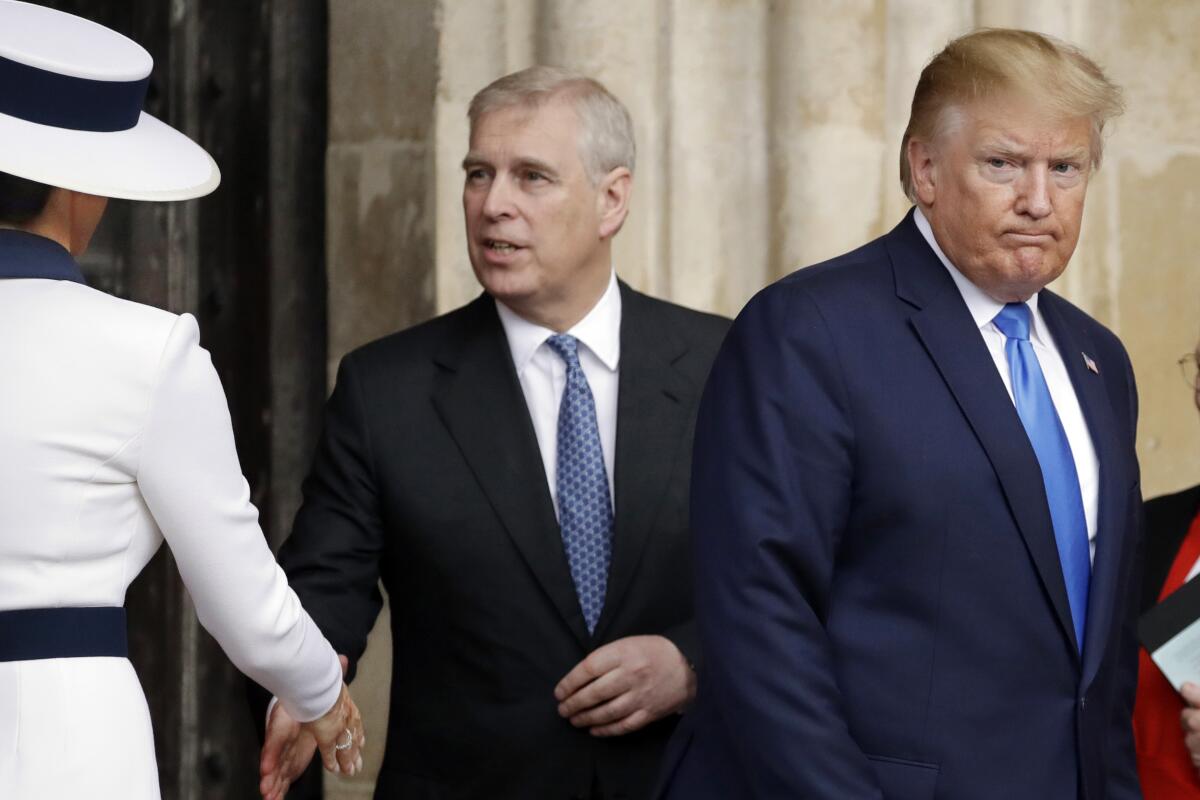
A New York federal judge Friday unsealed another wave of documents related to Jeffrey Epstein, the disgraced late financier accused of organizing a sex-trafficking ring involving girls as young as 14.
The latest release caps a week that has put Epstein and his suspected criminal operations back in the spotlight and provided more details about him, his convicted longtime girlfriend and associate, Ghislaine Maxwell, and the powerful public figures in their orbit over the years.
Among those named in the documents are several prominent figures known to have associated with Epstein, including former Presidents Trump and Clinton, former Epstein lawyer Alan Dershowitz, Prince Andrew and late former New Mexico Gov. Bill Richardson. Other names disclosed include billionaire Tom Pritzker of the Hyatt Hotels Corp., late AI pioneer Marvin Minsky and entertainers David Copperfield and Michael Jackson.
Their inclusion in the records is not evidence of criminal activity, despite internet-fueled expectations and conspiracy theories that the list would provide evidence of wrongdoing by powerful men. Many have previously denied any knowledge of Epstein’s behavior.
The documents stem from a lawsuit that Virginia Giuffre, one of Epstein’s victims, filed in 2015 against Maxwell. Giuffre sued Maxwell for publicly calling her a liar regarding her claims of abuse, and the parties settled out of court in 2017.
New records released Friday from that case offered some salacious details:
- A document containing hundreds of search terms applied to records from Maxwell’s devices included the words “slave,” “erotic” and “dildo” as well as more than 100 names. The list included “Clinton” and “BC,” presumably a reference to the former president, and “HRC,” presumably a reference to Hillary Rodham Clinton.
- A message for Epstein dated June 1, 2005, said that Jean-Luc Brunel, a French model scout, “has a teacher for you to teach you how to speak Russian. She is two times eight years old. Not blond. Lessons are free and you can have your first today if you call.”
- In her deposition, Johanna Sjoberg, who says she had sex with Epstein as a consenting adult, was asked, “Did Jeffrey ever tell you why he received so many massages from so many different girls?” She replied, “He explained to me that, in his opinion, he needed to have three orgasms a day. It was biological, like eating. ... I thought it was a little crazy.”
- Sjoberg also said that Maxwell welcomed Epstein having relations with so many girls. “She let me know that she was — she would not be able to please him as much as he needed and that is why there were other girls around.”
- Sjoberg said when she was first approached about a job that Maxwell told her she “didn’t want butlers because they’re too stuffy, and so she just liked to hire girls to work at the house, answer phones, get drinks, do the job a butler would do.” That work paid $20 an hour, she said. “The next time she called me, she asked me if I wanted to come over and make $100 an hour rubbing feet,” Sjoberg said.
- Anthony Figueroa, an ex-boyfriend of Giuffre’s, described how Epstein paid him “$200 apiece” for every girl he brought to the house, some of whom were his friends from school.
- John Alessi, who worked at Epstein’s home in Palm Beach, Fla., said that “probably over 100” females came to the house as supposed massage therapists over a 10-year period. Most of them were over 18, he estimated, and came to the house after working at local spas or resorts.
- “Prince Andrew spent weeks with us” and received daily massages, Alessi said in his deposition. He said that Trump would visit too, but never got a massage “because he’s got his own spa.”
Other revelations concerned Giuffre. She acknowledged in court papers that she’d burned a personal journal two years before bringing the lawsuit: “I was burning, like, memories, thoughts, dreams that I had, just everything that was kind of affiliated with the abuse I endured, and there was a lot of it in there. My husband is pretty spiritual, so he said the best thing to do would be burn them.”
Friday’s documents also included an email exchange between Giuffre and literary agent Marianne Strong in which Giuffre talks about selling her story to the New York Post. “There is also another major paper that has followed the story for a while and has worked with me before, they’re asking me again for the exclusive story…. [I]f they’re selling something this headline worthy and going to sell many papers and not to mention the ‘on-line’ inputs, I would also like to know that I am going to profit from this as well,” Giuffre wrote.
“If the NYC Post can agree to arrange a reasonable contract, above the competitors offer, then I will be able to give you all of the factual information that would give [the writer] a great piece,” she added.
Strong shot that down, writing, “No money changes hands in such a news release to a publication!”
Aaron Rodgers crossed a line for Jimmy Kimmel when the New York Jets quarterback hinted the late-night host’s name could surface on the Epstein list.
The troves of records released since Wednesday span hundreds of pages and offer a deeper look into Epstein’s alleged criminal activity along with that of Maxwell, who was convicted of child sex trafficking in 2021 and sentenced to 20 years in prison. It’s not clear how much material still under seal will be disclosed.
Among the revelations from Thursday’s distribution was an allegation by Giuffre that former President Clinton “walked into” Vanity Fair and “threatened them not to write sex-trafficing articles about his good friend J.E.,” presumably referring to Epstein. The email including the allegation was sent from Giuffre to her friend and journalist Sharon Churcher in May 2011.
The records have also included allegations of poolside orgies and insatiable sexual appetites on the part of Epstein and Maxwell. But as far as other supposed “clients” of the pair, details are relatively sparse. In addition, many of the people mentioned, including Jackson, Copperfield and actors Leonardo DiCaprio, Cate Blanchett and Bruce Willis, aren’t described as clients and aren’t accused of any improprieties. For example, entries in a memo pad — mostly of phone messages taken for Epstein — included mentions of clothing designer Tom Ford and disgraced Hollywood producer Harvey Weinstein.
JPMorgan Chase made millions by keeping Jeffrey Epstein as a banking client. Now it faces a reckoning in federal court.
A list of potential witnesses filed by Giuffre’s legal team included investor Ron Burkle, as well as Clinton and the former president’s aide Doug Band, who were said to have traveled with Epstein and Maxwell. In a list of relevant documents, Giuffre’s team listed “all photos of Ghislaine Maxwell at Chelsea Clinton’s wedding.”
Though Trump was not mentioned in the documents released Thursday, they showed that Giuffre’s team sought to interview “all staff and employees at the Mar-a-Lago Club” from 1999 to 2002. Giuffre alleged that she was lured into Epstein’s scheme by Maxwell while Giuffre worked as a locker room attendant at the Trump-owned resort.
Pat McAfee apologized after Aaron Rodgers came on his show and wrongly suggested that Jimmy Kimmel was among those named in court documents as associates of Jeffrey Epstein.
Because many of the documents are redacted or sealed, potentially vital pieces of the larger puzzle in understanding Epstein and his dealings remain incomplete. The Miami Herald, which published an award-winning investigative series on Epstein, and its parent company, McClatchy, sued in 2018 to make the documents public.
Records have been unsealed gradually over the years, though not in full, which the Herald has challenged. Last month, Judge Loretta Preska of the Southern District of New York ordered the public disclosure of the identities of about 150 people mentioned in court documents, where they were referred to as John and Jane Does.
The judge noted in her December order that part of the reason for the disclosure is that many of those names were made public over the years, including in media interviews, news and police reports, lawsuits and disclosures at Maxwell’s trial.
The Does had until Jan. 1 to ask the judge to keep their names hidden. According to Preska, two sought to keep their names redacted, and their requests are under review. The names of three other Does who the Herald reported are not victims remain under seal for various reasons cited by the judge; the media outlet is appealing that decision.
Lawyers for Dershowitz have also pressed the judge to release more of the sealed documents, arguing that the additional information would “circumvent potential reporting inaccuracies and misplaced assumptions.”
Epstein, 66, died by suicide in a New York jail in August 2019, weeks after he was arrested and federally charged with sex trafficking and conspiracy to commit sex trafficking of minors. A watchdog report released in June found that negligence, misconduct and other failures at the jail contributed to his death.
More than a decade earlier, Epstein evaded federal criminal charges when he struck a plea deal with then-U.S. Atty. Alexander Acosta in a south Florida case related to accusations that he molested dozens of girls. As part of the agreement, Epstein pleaded guilty to state charges, including soliciting prostitution. He registered as a sex offender and served 13 months in jail but was allowed to leave six days a week to work at his office.
That deal became the subject of an investigative series by Julie K. Brown, an investigative reporter at the Herald, that brought renewed attention to his case. Called “Perversion of Justice: Jeffrey Epstein,” the series detailed accounts by more than 60 women who said they were victims of abuse as part of a sex ring run by Epstein.
Times staff writer Ashley Ahn and Deputy Editor Jon Healey contributed to this report.
More to Read
Sign up for Essential California
The most important California stories and recommendations in your inbox every morning.
You may occasionally receive promotional content from the Los Angeles Times.
